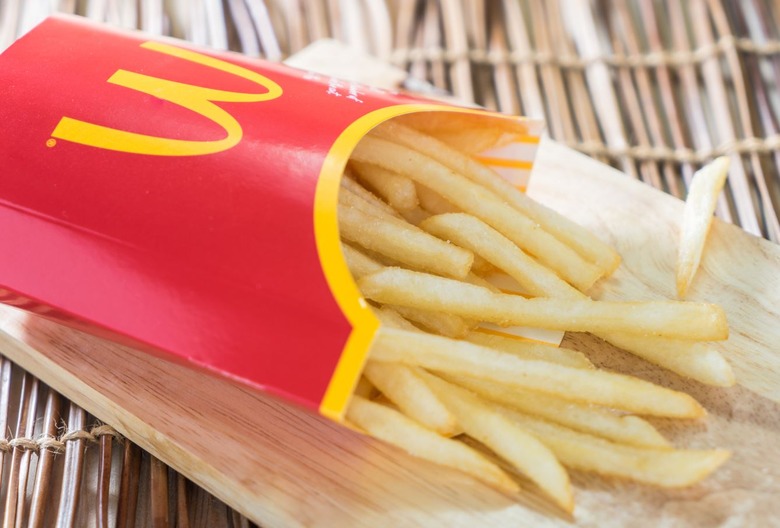McDonald's Needs To Start Cooking Its Fries In Beef Fat Again
If you had the opportunity to experience McDonald's French fries before 1990, consider yourself lucky. Up until that year, the chain fried its fries in a mixture of cottonseed oil and beef fat, and the results were spectacular: crisp on the outside, pillowy on the inside, and infused with an umami-rich, slightly beefy flavor. They were masterpieces, considered by many to be up there with the best fries on earth.
But due to fears about the dangers of saturated fat, in that year the company reformulated its fries and swapped out the beef fat for vegetable oil, and today its fries contain nearly 20 different ingredients, including hydrogenated soybean oil (which still contains saturated fat), and delicious-sounding chemicals with names like sodium acid pyrophosphate, dimethylpolysiloxane, and tertiary butylhydroquinone. It also contains something called "natural beef flavor," which is synthesized with amino acids, sugars, and citric acid. Though the "beef flavor" vegetarian, an ingredient in it is hydrolyzed milk, meaning that the fries aren't vegan.
While saturated fats were once widely assumed to be a leading cause of heart disease (especially in the '80s and '90s), today it's accepted in the medical and scientific communities that it's a lot more complicated than that; no experimental evidence has ever directly linked saturated fat to heart disease, and there are several different types of saturated fats, each of which affects the body differently. Burgers also happen to be high in saturated fat, so if you're ordering a burger and fries, you're probably not too concerned about consuming a little extra beef fat, anyway. And as for vegetarians? If you really want fries that aren't cooked in beef fat, you can find them at just about any other restaurant — and why would a vegetarian be eating at McDonald's, anyway?
None other than renowned thinker Malcolm Gladwell recently tackled this very issue, in the most recent edition of his popular podcast, Revisionist History. It's a must-listen: He describes how a drywall magnate named Phil Sokolof spent millions of dollars crusading against saturated fat and essentially single-handedly convinced McDonald's to drop the beef fat; and how a mist created by the new formula began making everything in the restaurants sticky.
In the 1990s, the era that insisted on bringing us Snackwells and low-fat everything (even if that meant replacing the fat with unpronounceable chemicals), it probably made sense for McDonald's to swap out the beef fat for vegetable oil. But we know better now, and McDonald's should, too.
